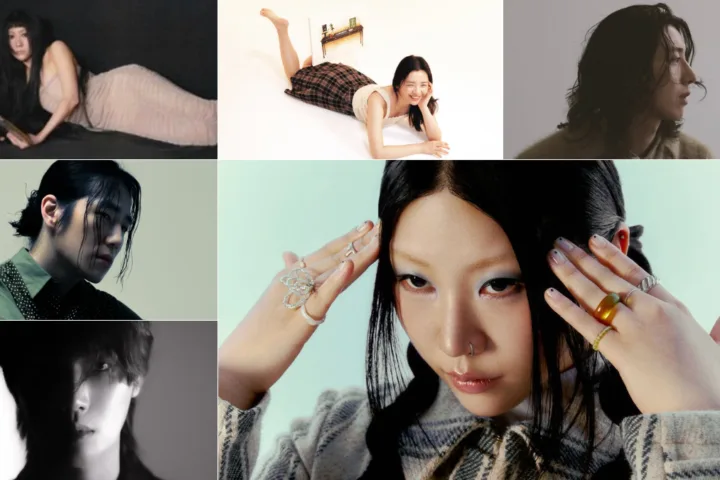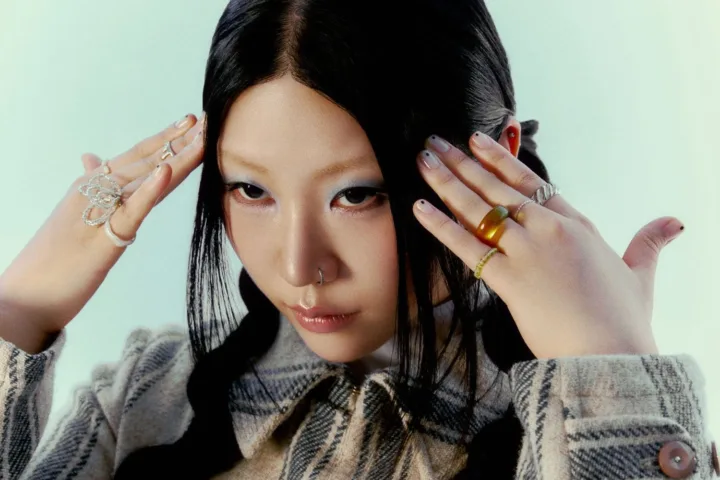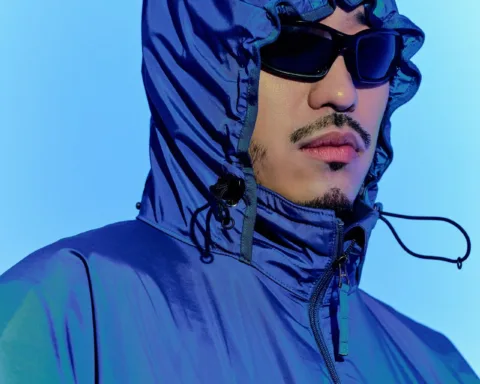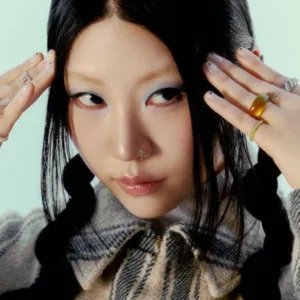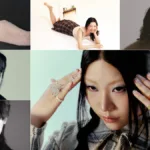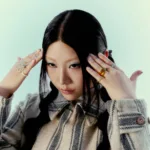We were able to interview the wonderful Dongyi who recently won the Korean Music Award for the Best Global Contemporary Album of 2023. Selection committee member Hyun Ji-woon wrote this about the album: “[…] when we reach ‘Ikaino’, we reach the ultimate settlement where all fences and borders that are bound by identity are destroyed. Could this bittersweet feeling of intersection between familiar newness and unfamiliar welcome be a messenger from the future?”
After listening to the album ‘a method for capsaicinoid analysis’ we were filled with questions, Dongyi was kind enough to answer them.
1. In your single ‘Wanwol’ you credited the sacred bell of King Seongdeok (771ad), sampled from the Gyeong-ju National Museum. How did you end up using that sample? And how does it correlate to a welcome?
First of all, I have been very interested in the Bell of King Seongdeok for a long time. I believe that the full moon and the loud sound of the gong sounding far away are very suitable. Additionally, I imagined playing the bass with the bow of a traditional Korean instrument. The sound is important, but the painting on the outside of a fairy playing a musical instrument is very beautiful. Recordings that have not survived as of now and pictures of people playing musical instruments from long ago have given me a lot of inspiration. During the Corona period, my place of residence changed, and I couldn’t move as freely as I used to, so my plans changed a lot and I was working hard to produce an album on my own.
At that time, the Gyeong-ju Museum recorded a new bell sound and released it as an open source. It was so amazing. I immediately received permission to use it by the museum through an acquaintance and used the sample. The sound of bells and Korean gongs are musical instruments that I have loved for a long time. I believe that the sound, the sound that puts the mind at ease, creates a feeling of openness, reconciliation, and harmony with new people, old friends, and others.
2. Can you explain your artist name? What does it signify for you? How does that correlate with the album?
In many countries other than Korea, my original name is difficult to pronounce. In Busan, where I grew up, My father always called me ‘dong-ah’, since I was young, and this became the name of my debut stage. The name ‘dongyi’ refers to a water pot in Korea, and also refers to a jar. I believe it is also connected to the Joseon white porcelain jars, which I have been inspired by for a long time. As a bass player, I have collaborated with many artists, and this jar can soak and chemically age them all.
3. Can you tell us more about the background of the album? What was your thought process?
The story behind the album is simple, but also complex.
This is the result of my experience with the diaspora over the past 10 years. Busan, Demilitarized Zone (Military Service, Border between KOREAS). Since 2014, I have spent a third of the year in Japan, Taiwan, and Jeju Island. I have been living in Kyoto, Japan since February 2019. I mostly stayed in a community of the Korean Peninsula who were born in Japan.
As I was finishing my twenties, an old friend, a bass player named Dong-il from Jeonju, Korea, he continued to push me to start producing my own album. For a year in Kyoto, I played solo bass (double bass, electric bass guitar, effects) with dancers and improvised alone for a long time. That recording became the big sketch for this album’s background on the Korean Peninsula.
A year passed when my Japanese visa was about to expire, he invited me, and I happened to visit Korea to renew my visa.
When I moved to Korea and Taiwan, I turned those recordings into sheet music.
I recorded simultaneously with my saxophonist Ojiik at Dong-il’s studio during a snowy winter. I wasn’t able to complete the album in two weeks, and as soon as I returned to Japan, the coronavirus outbreak happened and I couldn’t travel back and forth like before my lifestyle anymore. I moved to Taipei with my spouse and changed the direction of the album. I completed the editing myself, with help from old musician friends in Japan, Australia, and Taiwan.
This entire album took three years to complete. For those three years, I spent more time producing my music than playing an instrument. The result was naturally created based on the trust and love of my many Asian diaspora music colleagues with whom I have interacted and spent the past.
4. You’ve combined so many different traditional instruments and meshed them together to create one new entity, blending both traditional and contemporary (for example the vinyl scratches) as well as blending national identities. How was that process and did you learn anything from that?
The way I worked on this album was very free, and I think my identity came out unintentionally. I’ve been imagining a lot for a long time. For example, I sometimes enjoy boiling ramen by mixing bottled water from Baekdu Mountain, the highest mountain in North Korea, and bottled water from Hallasan Mountain, the highest mountain in South Korea. I like this way of thinking.
For a long time, like water and fire, people who have different tendencies and do not get along have been secretly mixed in my work to bring them together. (This does not mean that the artists who participated in the album do not get along well.)
There are many details in the album that I did not plan from the beginning. For example, the legendary Japanese guitarist Hachi, who appears in the second and fifth songs, is a musician I have admired for a long time. He lived in Seoul for a long time and has now returned to Tokyo. I asked him for a letter of recommendation in Japanese and sent him the music. However, he added electric guitar, wooden guitar, water phone, and ukulele sounds at will. Since we were not working together in a professional studio at the same time, there were some difficulties, but I was able to grow a lot in that area. In the case of the vinyl scratches sound, I asked an old Taiwanese DJ friend to send me the sound source and edited it myself. The PIRI player, (a traditional Korean bamboo flute), in the middle solo part of track 5 is a great colleague who guided me to fusion music when I was young.
Colin, an Australian musician who participated in tracks 6 and 8, makes his own instruments. He creates sounds of nature. We met a long time ago in Tainan, Taiwan, and I first invited him to the Jeju Island Music Festival. At that time, he handed over his sound files to me and told me to use them however I wanted. I had fun tuning it this time.
It was so much fun!
5. What does identity mean to you and how did your own identity influence this album?
From a young age, I had deep concerns about studying, reproducing, and creating jazz as an Asian. The experiences of many diasporas I encountered by chance changed me greatly, unintentionally. The country is divided into two and is still in conflict, even approaching 100 years. However, the village I saw in Japan still retained its appearance before the division.
I only know half of Korea. History is made by us. What you need is left behind, and the facts you don’t like or don’t want to believe are erased.
I saw the roots that had disappeared. I saw that the land was richer than the land I grew up in at some point, but they didn’t know what they still had and only focused on what they didn’t.
Basically, I have been working as an improviser, and sound researcher for over 10 years at the villages where I come and go and I really enjoy composing again using from the records of sound discoveries I make during performances. I think my personality, experience, and work style were fortunately a good fit for my music.
6. ‘Shippo Musubi’ is one of the few tracks with spoken word. How did you decide on that poem and where does it fit within the story of the album?
While completing the album, I unintentionally became an immigrant abroad. I have seen many people living in the diaspora world turn away from themselves.
This is a handshake that connects one’s roots with other roots.
For this song, I created a poetry song with Furukawa Yuki, a dancer who created a piece with me when I was living in Kyoto. At that time, we were performing in Kyoto and Korea based on this poem. After that, I moved to Taipei and completed the sound design on top of her poetry reading. The main content of the poem is to imagine a tail that existed in humans a long time ago and compare it to a certain heart that has disappeared from people. The tail, like the hand, is a medium for spiritual and material contact with other beings.
It can be said to be a prayer song in which my tail and the tail of a being from another planet (a lost, forgotten heart) shake hands with each other.
7. You’ve worked with a diaspora of nationalities for the features on the album. How was that process?
I think of it as a shining mirror to find myself. It was unfamiliar but natural, and I think it was a good fit. Thanks to the trust of my colleagues, I had a lot of fun and learned a lot.
8. What does it mean to make jazz in such a fast-paced industry like the music industry?
I didn’t think about making a jazz album. I tried to give shape to what was inside me, my diary, and some language. I enjoy listening to old and new albums by great jazz heroes, and I also often listen to new fusion world music. Of course, I admire great artists who keep old traditions alive. In 2024, I think it is unnecessary to divide genres.
Instead, I think that jazz can be included in various pieces in the musical language of the new era young people in some way as what before. Some people still listen to the Beatles, Bach, and some like NewJeans. You can’t please everyone. New traditions. Old future.
9. How did it feel to win the Contemporary Album Award at the Korean Music Awards?
Actually, I still find it hard to believe this. However, in the rapidly changing music culture and cultural trends, I gained the confidence to believe more in my power, and I accepted it as a sign to work harder and have fun. This made it much clearer to me what I had been doing over the years. It has become a big mirror where I can look back on both the good and the difficult times. I am so grateful to everyone who selected me for the award and supported me. I’m looking forward to a new beginning.
You can listen to the full album on Spotify here.



